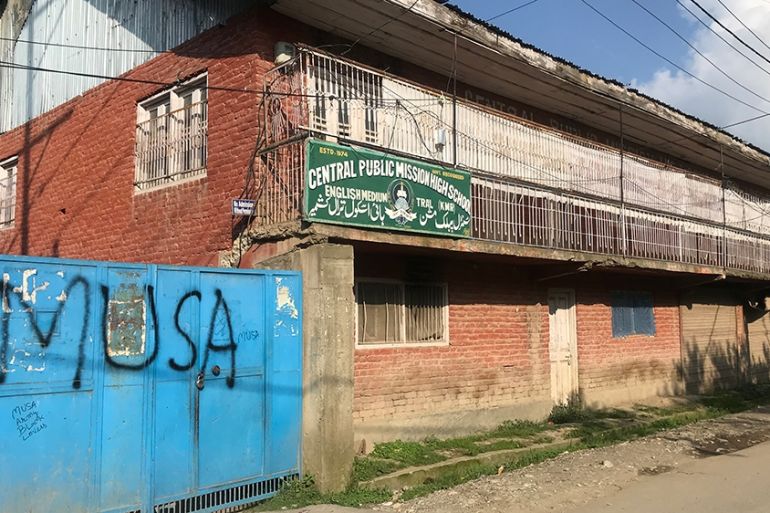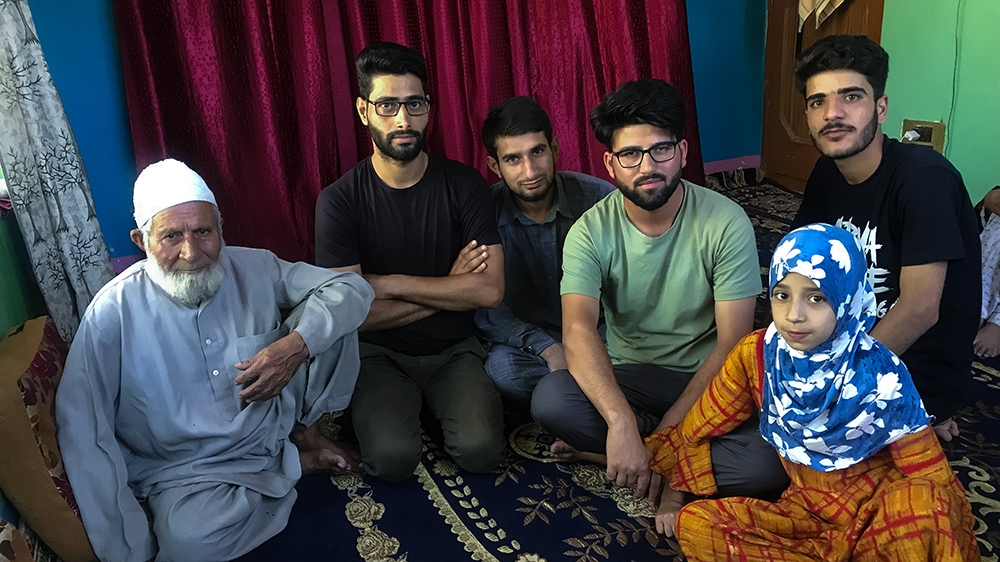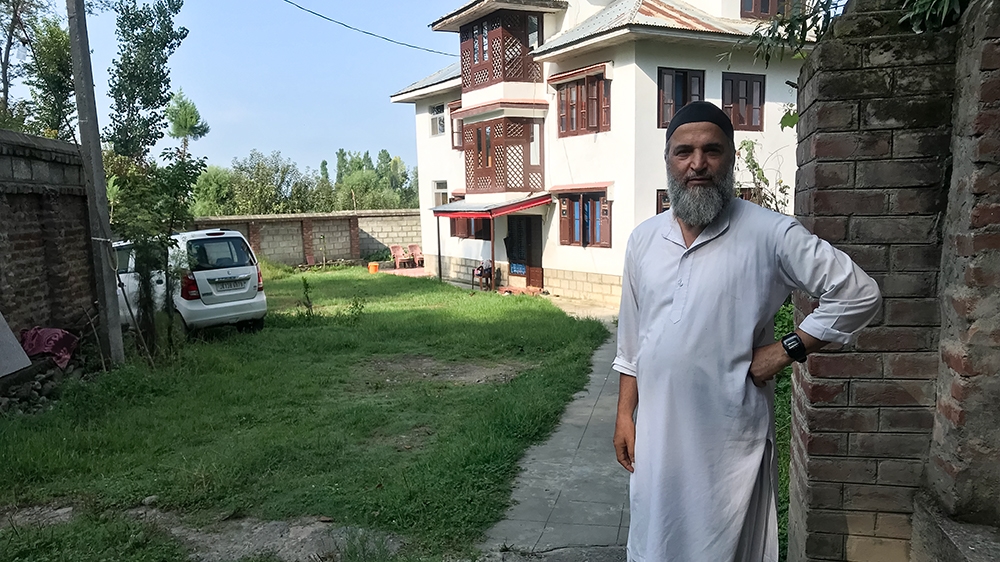Will India’s crackdown in Kashmir fuel further violence?
Intense military lockdown stirs calls for armed resistance but a veteran separatist leader backs non-violent protest.

As India extends its military lockdown in Kashmir, there are fears that the resistance movement may adopt a strategy of violence to fight against the punishing measures – which include mass arrests, a communications shutdown and alleged police brutality and harassment.
Chants of “one solution, gun solution” have recently resounded at protests in the Muslim-majority Indian-administered region, which on August 5 was subject to a military crackdown after the federal government revoked Article 370, which had granted Kashmir a degree of autonomy.
Residents have since reported a widespread campaign of police violence and harassment, with more than 150 people suffering injuries from tear gas canisters and pellets in clashes with paramilitary personnel, as security forces rounded up thousands, including children, sometimes in the middle of the night.
At least one alleged Kashmiri rebel and an Indian policeman have been killed in gun battles since August 5, with frequent reports of casualties at the Line of Control, the de facto border between India and Pakistan.
Rasheed, a 24-year-old graduate from the town of Awantipora, said paramilitary police have targeted him since he rejected their offer to spy on his community.
“If this harassment continues, the only way to protect myself is to join the militants, pick up a gun,” he said. “I prefer to die only once, rather than dying multiple deaths every day.
“Recently, two paramilitary personnel came to my house and threatened me with a case under the Public Safety Act if I don’t accept the offer. I would never work for an Indian security agency.”

India deployed thousands of extra troops in advance of its August 5 move, with residents reporting an increased military presence on Fridays – the Muslim holy day when protests often break out.
In Tral, a town about 40 kilometres from Srinagar, police told Al Jazeera that “many troublemakers” had been arrested over the past three weeks.
Residents estimated the number of arrests in the area was in the hundreds, and included a 12-year-old boy.
“They picked him up for stone-pelting but the truth is, he was confined to his house. He didn’t even go to school,” the boy’s aunt told Al Jazeera.
Tral resident Tariq Dar feared that these experiences might push boys and young men to violence.
“When they are being picked up, questioned and tortured for no reason, how else will they heal their wounds, other than picking up guns?” he said.
Human rights violations have been routinely reported in Kashmir since 1947, after the Partition of India.
Sameer, an 18-year-old from Tral, said he feels particularly hurt now by the suspension of phone lines and the internet as the government stripped the region of its special status.
“The Indian government has made us non-existent in one blow,” he said. “If we follow the path of armed resistance like Burhan [Wani], we would at least feel we have done something fruitful to avenge this humiliation.”
The disputed territory last witnessed extreme curbs in 2016, after the killing of popular rebel fighter Burhan Wani, who was aligned with the Hizb-ul Mujahideen group. Wani’s death led to months of anti-India protests, in which hundreds of protesters died.
Speaking to Al Jazeera, Wani’s father, school principal Muzaffar Wani, adopted a peaceful tone, warning students against joining armed groups.
“Children don’t have the strength to bear the torture that we have been bearing for the past 70 years,” he said. “Currently, everyone has been forced to remain silent. We will know how the boys react only after this lull.”

Separatist leader Syed Ali Shah Geelani, chairman of the All Parties Hurriyat Conference (APHC), also backed a non-violent approach, recently calling for “peaceful protests and demonstrations” against the “naked Indian brutality”.
In an open letter dated August 23, he said: “We must remain absolutely disciplined and not give the enemy, who is armed and ready to kill, any excuse whatsoever to hurt our lives and property. It is very important that our demonstrations remain absolutely peaceful so that more and more people are able to join.
“If the Indian armed forces still attack our gatherings, the entire responsibility for the possible loss of lives and property will be on them, and the world will remain witness to their deeds.”
Dilbag Singh, director general of Jammu and Kashmir police, did not comment on the alleged detention of minors but said: “Detention is a dynamic process. We keep picking up men and releasing them.
“Whenever our intelligence reports reveal any boy is joining militancy, we tell his parents that he too will get killed like Wani and Musa, then the parents try to dissuade him,” he told Al Jazeera, adding, 127 “militants” have been killed this year.
Zakir Musa – real name Zakir Rashid Bhat – was an al-Qaeda-linked rebel commander from Tral, who was killed in a police raid in May this year.
Singh claimed 70 men had joined armed groups so far this year, compared with 120 in the same period a year ago.
The ruling Hindu nationalist Bharatiya Janata Party (BJP) launched a hardline policy, “Operation All Out”, in Kashmir in 2017 to flush out armed groups.
But Delhi-based defence expert AS Dulat said this approach was limited.
“The excessive use of force won’t work if you use it as a policy to sort out Kashmir insurgency. There will be a reaction to it. Remember, the whole population is angry.”
National security analyst Happymon Jacob, also in New Delhi, said historically, “political missteps” have led to more violence in Kashmir.
“What has happened now is a step further,” he told Al Jazeera. “New Delhi has not only stripped Kashmir of the statehood but also made mainstream politicians irrelevant. These factors could lead to a spike in violence in months ahead.”
Several former chief ministers of Kashmir have been put under house arrest since August 5.
As Friday approached, bringing the possibility of further protests, Rasheed, the young graduate in Tral, reflected on how young men like him are viewed by the state.
“The Indian government labels all Kashmiris as terrorists,” he said, suggesting if the lockdown continued, perhaps time would come to “prove them right”.